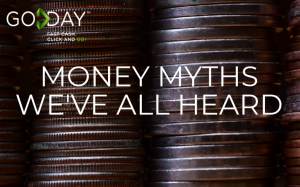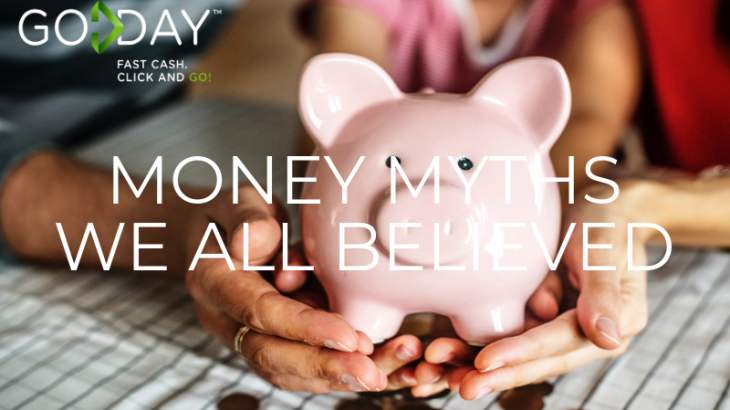

It’s easy to be misinformed when it comes to your personal finance. We’re surrounded by tons of information being thrown our way from online, family and friends, financial advisors, our banks, and the list goes on. Finance can be confusing, especially when everyone is telling you something different.
We’ve all made foolish money mistakes because of not being educated enough on what we’re actually doing when it comes to our finance. Whether it’s the personal loan we shouldn’t have taken out, or the car we bought that we couldn’t afford (but the salesman convinced us otherwise).
We’re here to bust some of those common money myths that we may believe or have been told.
Buying a home is better than renting
There are tons of people that still believe that buying a house or condo is a much better investment than renting. This may have started from the typical American dream stereotype where you go to college, find a job, get married, buy a house, have kids. The reality is, this isn’t always the case for most people. We no longer are following the age old “traditions” that our parents or grandparents once did. For many years, buying a house was a great investment, and we’re not saying it isn’t now, however, owning a home is not for everyone, especially from a financial standpoint.
The reality is, if you are young, new in your career, and just getting on your own two feet, renting can actually be a better option for you. Not only does it give you more flexibility, but it’s also less work, and you won’t be killing yourself trying to make the impossible ends meet.
How do you know if you’re ready to purchase a home? There are a few things you should check off your list first:
1) Have the savings
Before you buy a home, you’ll need to prove to lenders that you have the ability to save, and you’ll need enough money for a down payment of at least 10% (ideally 20%) of a home’s worth. Plus, the more you can put down from day one, the smaller your mortgage will be and the less interest you’ll have to pay. You can’t forget all the added expenses that will come with owning your home too like your water bill, hydro, maintenance, landscaping, etc.
2) Have no commitment issues
You need to be ready to commit to being in one place for an extended period of time. Closing your house, moving, etc. can add up and you don’t want to be doing it often. Plus, you’ll want to wait until your home increases in value before you sell it. If you don’t feel confident in committing, renting is probably a better option for now.
You have to be rich to invest
When you think about investing, it’s likely that you think you need to be already rich before you can do it. However, the reality is, you can invest no matter what level of income you’re at, and it can actually be one of the best ways to grow your wealth. You can start investing by putting in very minimal money each paycheck, and you don’t need to worry about high risk investments where you lose everything. Investing comes in all shapes and sizes, however, to learn what you’re doing, it’s important to educate yourself, and/or use services like WealthSimple which helps you a) better understand what you’re doing and where your money is going, but b) takes the grunt work out of it, and allows you to have peace of mind that your money is being properly invested to benefit you.
I don’t need to worry about my money, my partner manages it
It’s always great to have a partner that is good at managing your finances so you don’t have to worry about it, but one of the biggest financial mistakes you can make is just that, letting your significant other do it all. First off, the divorce rate is huge, and even though you may be madly in love, happily married, or whatever, wouldn’t you rather be prepared and knowledgeable if anything was to happen?
None of us should leave any aspect of our life entirely in the hands of someone else, especially your finances. Communicating regularly about your family finances is important, or you may end up with some surprises, and not good ones. Plus, things are meant to shared in a relationship and this is one of them. It’s okay to let them take the lead, but make sure you are informed and involved in decisions and know where your money is and is going.
I have a line of credit for my emergency fund
You may think that you don’t need an emergency fund. Maybe you’re too young, don’t have a family, or just don’t think that anything bad will or can happen to you. However, this is one of the biggest financial mistakes people make, and then suddenly something unexpected hits them and they’re in debt or stuck in a financial rut.
First off, everyone should have an emergency fund, but second off, your savings don’t count as an emergency fund. If you’re saving in an RRSP for retirement, or saving for a house, etc. that money should be for just that. Your emergency fund should be for an emergency only. Put a little bit away each paycheck and build a bit of a cushion incase something happens like you get laid off from your job, you get in a car accident, you need dental work done that isn’t covered on your insurance, the list goes on. Also, make sure this money is in an account you can easily access, but also keep it separate from your everyday accounts so you don’t accidentally spend it.
RBC has a tool to determine how much you should have saved in case of an emergency based off of your current salary.
All debt is bad
A popular misconception when it comes to your finances is that all debt is bad. Often we avoid that scary “d” word, but the truth is, no, all debt is not bad.
Yes, carrying a balance on your credit card or a high-interest loan can cost you a lot of money. Sometimes even more than you originally borrowed, but not all debt will hold you back or put you into further debt. In fact, debt can sometimes help you move forward. For example, a mortgage or a student loan. These types of debt can help you achieve your goals and grow, and you’re essentially funding an investment which in the long run can be financially beneficial, and the interest may be tax deductible. The key is to make sure you’re not taking on too much debt, ensuring you have a repayment plan, and that you shop around to find the best option for you that ideally doesn’t have a high interest.
Find info about the loan market in Canada here.
There’s no point in saving until I make more money
Why would I save money when I hardly even make that much to begin with? This is a common question most people have, and also a huge myth. It’s amazing how much of a difference saying a bit of each paycheck can make in the long run. Sure you may have just started your career and retirement seems like it’s a million years away, but if you put away even $50 a month to start, and increase that number as you make more money, you can suddenly find yourself with a good cushion for when it comes time to retire, buy a house, or whatever that life milestone may be.
How do you know how much to save? In short, save as much as you possibly can while still maintaining your life necessities like rent, and food, and of course, while still maintaining a life. You don’t want to forego everything fun in life because you’re saving for the future.
In conclusion, yes, saving is important, but It’s important to consider a few key things before you start:
1) Make sure you are putting your money in the best possible place such as an RRSP account for retirement, or a tax-free savings account. You first off don’t want your money to be easily accessible, and second off, you want to make sure your money is making money while it’s sitting there.
2) Create an emergency fund separate from your savings for long-term goals. Your RRSP isn’t easily accessible if you need money NOW, so building a cushion in another account that you can easily access if an emergency happens is important.
3) Regularly contribute without making excuses. Set-up auto payments, or do what you have to do in order to regularly put money into your savings. You won’t get anywhere if you decide spending your money on short-term things is more important. Plus, when you learn to live without that extra few dollars each paycheck, you forget it even existed.
Avoiding credit cards is key
Credit cards don’t always need to be avoided like the plague. Unless you have a bad habit of maxing out every credit card you have and instead of paying it off, signing up for a new one. For the most part, credit cards can be a perfectly fine mode of payment, and in fact can even benefit you if you have cards that allow you to earn points or cashback as you use them. Plus, demonstrating responsible use of credit cards can help you increase your credit score which makes it easier to buy a car or home later on.
To keep a few responsible credit card tips in your back pocket, here’s what we recommend:
-
- Pay attention to minimum payments and due dates
-
- Regularly check your credit card bills – don’t just wait to get them in the mail
-
- Close cards that you aren’t using
-
- Make sure to pay off your balance and don’t spend more than you have
- Cash in on the right rewards for you by doing your research before signing up for a credit card
Overall your financial matters don’t need to be scary, and it’s important to understand what’s just a myth and what’s the truth. Educating yourself on different financial matters and making your own opinions about them can be your first step in better understanding your finances.



